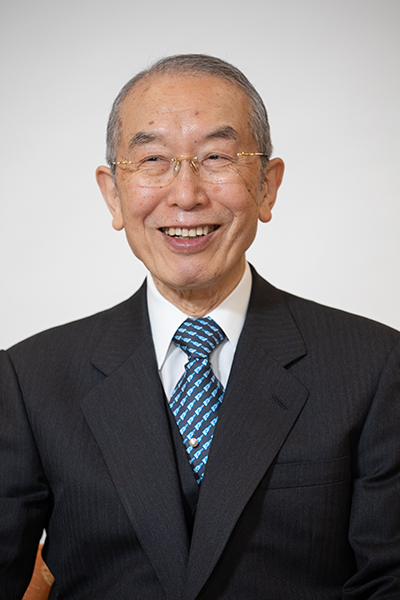Nurtured by Encounters—The Mind of Reverence and the Mind of Humility, Part 2
December 2024

Encounters That Share the Buddha’s Teachings
The Heian-era monk and poet Saigyo (1118–90) wrote this poem: “Collecting the dew / On every blade of grass in an autumn field, / I will make a lotus pond.” In this poem, Saigyo describes a beautiful scene, perhaps from late autumn or early winter, when crimson maple leaves glisten with morning dew. Although morning dew usually symbolizes something fleeting, that vanishes, he wrote that by gathering it together, it can become a lotus pond full of pure dew. While this poem seems to be describing the wonders of the natural world, Saigyo in fact alludes to this passage of scripture: “May these merits / Extend universally to all / So that we and all living beings / Together accomplish the Buddha Way” (“The Parable of the Conjured City,” chapter 7 of the Lotus Sutra). Therefore, the “dew” is really the buddha nature.
Saigyo lived during the Heian era, when many people in Japan suffered from a series of natural disasters, plagues, wars, and famines. Saigyo must have worried in such difficult times and wanted to liberate every single person who was experiencing poverty and other hardships. Although some nine centuries have passed since Saigyo’s time, to my eyes, there are no major differences today in the fundamentals of this world. To wit, everyone, everywhere in the world, still hopes to make their society as beautiful as a lotus pond, filled with people who are awakened to their buddha nature.
What we can do, each and every one of us, to make this happen, is to fully realize our own buddha nature and then strive to create a world in which everyone respects one another and lives in harmony, by closely interacting with and caring for people who are suffering. Simply stated, what we need now more than ever are encounters that share the teachings and spread the Dharma.
A Lotus Pond Sparkling with the Light of the Buddha Nature
As I mentioned in last month’s issue, when we give rise to the mind of reverence, the mind of humility also spontaneously arises. I myself had a painful but valuable experience that unexpectedly taught me how the mind of humility arises.
It was the summer of my third year of university. At the time, I was a student at a kendo training hall (which was also the teacher’s home), and I was scheduled to spend two months there for intensive training. Although I myself had applied for this program, after a month of kendo training and doing chores such as cleaning, I was exhausted and ran back to my own home. The next day, my teacher, Tokichi Nakamura, immediately came to my house and, in a loud voice that bounced off the walls, said, “Right now, you are no different from my own kid. Well, come on, we’re going home!” And of course he took me back to his training hall. I still feel deep respect and gratitude for my kendo master, who seriously scolded me; at the same time, I remember that back then, I reacted emotionally and felt rebellious, saying to myself “To hell with this!” When we are lacking in awareness and the will to improve, our emotions may take precedence over self-reflection and erupt in shameless thoughts.
However, an expression of displeasure may cause us to admit that we cannot go on in such a way and motivate us to try to improve ourselves. As with the buddha nature, we are all equipped with the mind of humility; in my case, when it was activated, I was able to change my mind and try to regain my kendo master’s trust.
I think this is the same as the way acknowledgment and remorse are, in our lives of faith, important for considering our growth as human beings.
Indeed, it is through our interactions with others—what we call “encounters”—that the mind of reverence and the mind of humility are awakened. The Rissho Kosei-kai practices of mentoring and guiding people to the Dharma also have great significance in nurturing that mental state in oneself and others. Although we are still being careful not to spread infectious diseases, if there is someone around us who is worried or in trouble, I think that we have a role to play by lending a helping hand and making that encounter an opportunity to expand the circle of people connected to the Buddha’s teachings and transform the local community into an oasis—a lotus pond sparkling with the light of the buddha nature. To ensure that we do not forget this, we should deeply ponder the aforementioned lines of scripture during our daily sutra recitations and vow to build a world where everyone, through awareness of their own buddha nature, experiences happiness.
The first step toward building that world is for every one of us to exchange cheerful greetings and show each other kindness in our homes, workplaces, and communities. That said, looking back on this past year, have all of you been your best selves?




